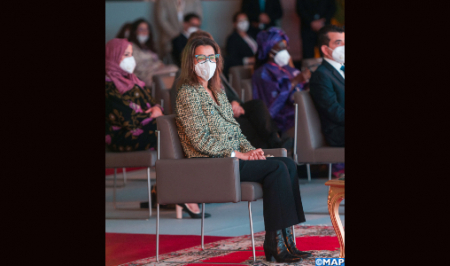


Upon her arrival, HRH Princess Lalla Meryem reviewed a municipal guard detachment that paid the honors, before being greeted by the Minister of National Education, Preschool and Sports, Chakib Benmoussa and the Minister of Solidarity, Social Integration and Family, Aawatif Hayar.
HRH Princess Lalla Meryem was also greeted by the Wali of Rabat-Salé-Kénitra region, Mohammed Yacoubi, the region's Council President, Rachid El Abdi, Rabat's Communal Council President, Asmaa Rhlalou, Rabat's Prefectural Council President, Abdelaziz Derouiche, the President of the Agdal-Riad District Council, Abdelilah Idrissi Bouzidi, and ICESCO Director General, Salem Ben Mohamed El Malek.
After verses of the Holy Quran were recited and the national anthem was played, ICESCO Director General delivered a speech in which he expressed his sincere thanks to HRH Princess Lalla Meryem for her special interest in the cause of women and his deep gratitude to His Majesty King Mohammed VI for granting his patronage to the ICESCO Year for Women.
He stressed that the proclamation by ICESCO of 2021 as the Year of Women under the theme "Women for the Future" is not fortuitous, but is rather a well-deserved decision to pay tribute to women, in recognition of their pioneering roles before and during the COVID-19 pandemic, noting that this initiative reflects ICESCO's concern to guarantee women's right, to grant them their just value and to promote their role in building the future.
He also reviewed the various programs, projects and initiatives implemented by the Organization that marked this year dedicated to women.
Afterwards, HRH Princess Lalla Meryem followed a video presentation entitled "son de cloches" (Sound of Bells), before proceeding to the launch of the "Bells of Awareness on the Role of Women in the Future of the Islamic World".
Her Royal Highness Princess Lalla Meryem also visited the different spaces of an exhibition held on this occasion, which includes plastic arts and handicrafts.
ICESCO has declared 2021 the Year of Women to pay tribute to women, strengthen their pioneering role and raise their status within the framework of the Organization's new vision under its Strategic Plan 2020-2030, which aims at building an innovative and creative civilizational system for the Islamic world, and ensuring women, youth and children their educational, scientific, cultural, technological and environmental rights.
The program of the Women's Year was marked by its diversity and focused on several axes, which mainly concerned the empowerment and capacity building of women, their integration into society, literacy and protection of girls' right to education, as well as the fight against gender inequality.